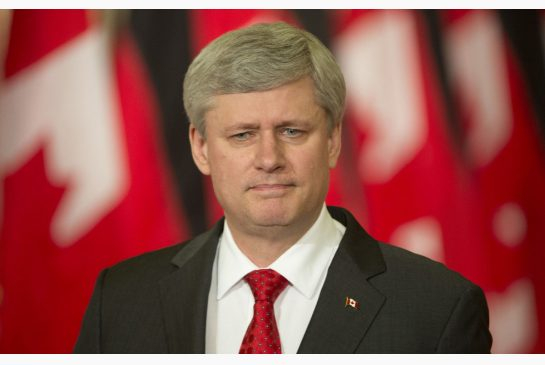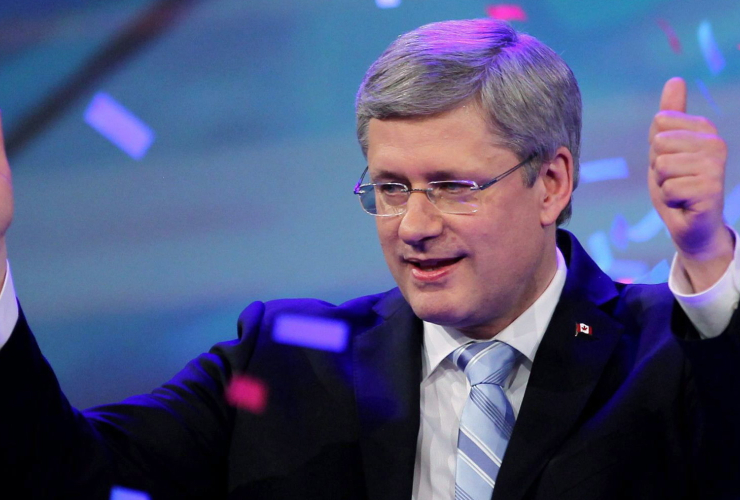Stephen Harper and his Conservative colleagues have two big plusses on their side. But we have three on ours – and three is greater than two.
First. Let’s talk about what Stephen Harper has in Canada's 2015 federal election
#1. The Conservatives have more money in their bank account than any other political party in the country – roughly twice as much as their nearest rival – which allows them to buy endless advertising time in the public media, where they can create a world exactly as they want us to see it.
#2. The Prime Minister and his staff at the Prime Minister’s Office have nearly total control over the entire machinery of government – including its spending habits — control that Stephen Harper has been energetically consolidating, behind the scenes, since he was first elected to minority leadership in 2006.
The shrinking down of government – “small government” – which has been a dominant theme of the Harper administration from even before the Conservatives were elected, has had one over-riding objective and outcome: the parallel building up of the power of the PMO, the secretive place where the real decisions are now made about how the country is run.
Canada now has a hidden government within the shell of our former government.
Perhaps these two strengths are also, in reality, Stephen Harper’s greatest weaknesses.
Unlimited campaign funds: is it really an advantage?
Let’s start with the money and the endless ads.
Ask yourself this: let’s say you never liked whiskey. How many times would you see an advertisement for a bottle of whiskey, before you’d give in and buy some and down it?
Or say you swear you’d never be caught dead in hot pink spandex tights; how many ads would it take before you’d cave and buy a pair and wear them proudly to the mall?
If you don’t drink whiskey, or you don’t crave seriously pink stretch pants, you’d look at the ads, shrug, and walk away. If you even noticed them at all.
But if you saw them all over the place, you might just start to be a bit peeved.
They certainly wouldn’t make you buy something you really didn’t want.
So the weakness embodied in having lots of moolah and buying airtime, TV spots, paper and digital and audio and poster and billboard and sticker and sign ads…. is that they’ll turn anyone off who isn’t already a dyed-in-the-wool Stephen Harper fan.
Did all those thousands and thousands of Enbridge ads make you want to rush out and build pipelines?
Snowing us with Conservative ads can make people mad enough to actually get out and vote against the Conservatives – even if they don’t normally vote, and even if there’s a large or small gift (bribe?) attached.
Like one of the goodies that Pierre Poilièvre (and just about every other Conservative MP who’s able to talk) has been handing out in the weeks and months before the campaign officially began.
Many people’s irritation will be fuelled, no doubt, by the knowledge that most of the Conservative funding is coming from a very small group of very wealthy people – the 1%, or more properly, the 0.01%.
Unlimited political power: it’s getting annoying – and just a touch scary
Turning to the second point – the amassing of more and more decision-making power in the Prime Minister’s Office, and in the hands of the Prime Minister himself – this process contains an Achilles heel. (Achilles, an ancient Greek warrior, was dipped in the magical River Styx as an infant, making his body immune to injury – except for the heel by which his mother held him. And that’s where he got nailed.)
Canadians are not necessarily going to accept a highly autocratic and dictatorial government, despite Stephen Harper’s best attempts to disguise it.
Many immigrants came to Canada from other parts of the world to escape oppression. They will not necessarily like the idea of returning to a system that is inching towards arbitrary state control and a one-party system.
The First Nations of Canada, long repressed by the residential school system and the genocidal policies that underpinned it, are coming back into the public space in waves, animated by the spirit of Idle No More, and the powerful, liberating effect of the Truth and Reconciliation Commission. Their acceptance of governance by arbitrary decision-making – which was hardly there in the first place — is evaporating rapidly, especially as the Conservative government fails to reach out in real ways to aboriginal communities.
Canada’s youth, now increasingly populated by a more open-minded Generation Y, has been burdened with punishing debt loads and facing uncertain job futures. They are less and less comfortable with a government that tells them what they want, rather than asking.
Their involvement with the Occupy Movement reveals a deep-seated revulsion towards the alliance between big business and governments. For many young people, their dialogue has been informed by such well-spoken, well-informed and cogent commentators as David Suzuki, Chris Hedges, Naomi Klein and Noam Chomsky.
Further, many Canadians don’t fit the conventional nuclear family “norm” any more. The fastest growing "family” configuration is the single person, followed by couples without children. LGBT persons, in or out of relationships, are an important demographic in Canada. More people are living common-law every year than are joining together in formal marriage. Many of these sectors in our country aren’t even acknowledged in political calculations – and most are actively discriminated against by the Conservative Party and Stephen Harper.
“Civil society” holds an important key
Most important of all, there has been, in the last quarter-century, a massive and sustained growth in the number of citizens’ groups, in all areas of public interest, which now command respect, understand effective communications and have considerable expertise that matches and at time exceeds that of “official” spokespeople.
Such organizations as the David Suzuki Foundation, Canadian Centre for Policy Alternatives, Evidence for Democracy, Doctors without Borders, Greenpeace, Democracy Watch, Canadian Association of Physicians for the Environment, Kairos, Oxfam, Salmon Are Sacred and the Council of Canadians (to name only a tiny fraction) regularly challenge the controlled messaging of political and corporate spokespeople, and act to bring about social change.
This expansion and strengthening of “civil society” has altered the face of public discourse and enriched and diversified the often simplistic and self-serving public relations pronouncements from vested interests.
Proof of non-profit societies’ growing clout can be found in the aggressive efforts of the Harper government to exhaust their material resources and silence their voice, through such means as arbitrary and punitive Canada Revenue Agency audits and Draconian funding cuts.
So let’s look at three ways Canadians can fight back against the political and social control that Stephen Harper is busily increasing through gathering and spending money, and exploiting the political system for his personal ends.
People’s asset #1: voting voting voting……and did I mention voting?
First, let’s vote, dammit!
Only 61.4% of eligible votes cast their ballot in the 2011 election – the third lowest turnout in Canadian history (in the 2008 election, turnout was the lowest ever in Canada, at 58.8%). The people who didn’t vote, by and large, were people who wouldn’t vote for the Conservatives anyway – marginalized people, people in remote communities, disadvantaged people, students and other young people, First Nations, and people disillusioned by what they see as a generally unresponsive, corrupt or irrelevant political system.
If people in all these parts of Canadian society were to vote, the Conservatives would be gone; moreover, all the other parties have vowed to reform the “first-past-the-post” electoral system so that today’s disenfranchised voters will never have to “waste” their vote again (Fair Vote Canada can tell you more).
Voting in this election – an election like no other in living memory, is critically important.
You can register to vote at the Elections Canada website.
Go there to make sure you get on the list to vote, because the Conservative Party, with its deceptively named “Fair Elections Act,” has actually made it harder to become registered and to vote. The Elections Canada website, however, is user-friendly. And there will be Elections Canada offices established in just about every community in the country, now that the campaign has been officially opened, where you can also get help.
Voting in this election for a party that favours electoral reform (all but the Conservatives) will ensure that democracy will be enhanced in all future elections, as well as in the day-to-day running of the country.
People’s asset #2: the Internet and social media
Second, we can all use social media to share our wishes, and to express our support for changes that enhance democracy. We can inform ourselves, and inform others, about the issues that matter to us – not just things that we want to buy, but things in our communities that we care about – like satisfying jobs that carry meaning in our communities, and real training and education programs that don’t result in colossal indebtedness.
Add to that list a major shift away from climate-changing fossil fuels and an expansion of the renewable energy sector; more parks and recreational areas; more music and theatre and celebration of who we are in general.
In that vein, more fairness and opportunity for First Nations (that’s a big one), more support of refugees fleeing to Canada for safety, more tolerance for people who are “different” but only superficially so (LGBT, people of colour, people who speak languages other than English) – and generally a more diverse, welcoming and positive society.
By doing this, we will rein in the minority of rich, older, entrenched and established citizens who currently control the political process, who don’t want to share with the rest of us— and by making them far less dominant, support the move towards a more inclusive Canada.
People’s asset #3: we don’t have to do it alone
Finally we can join in with one or more of the abundance of non-governmental organizations that have sprung up in vast numbers all over Canada, and the world, and which afford the power of group action to advance causes that would otherwise seem hopelessly daunting.
I had the privilege of being part of one such group, the Wetland Alliance: The Ecological Response (WA:TER) that sharply restricted plans, from an alliance of Walmart and SmartCentres, Canada’s largest builder of “big box” shopping centres, to build in the delta of the Salmon River, which runs through my home town of Salmon Arm, BC.
We did it with a core group of fewer than 10 people, all ordinary citizens with various levels of skill and experience. We accomplished this despite little or no initial support from the provincial and federal governments, and with active opposition from our local municipal politicians.
These are critical times
Change for the better is possible, and perhaps inevitable.
If we pull together, this election can easily lead to the re-establishment of the principles of democracy— repudiating a political system (and its leader) who have shown how the current system makes it frighteningly easy to take them away.
Voting essentially costs nothing, and networking digitally and/or becoming part of a non-profit working for a better community or society cost little or nothing. Yet they can teach a critically important lesson to one of the wealthiest governments this country has ever seen.
Canadians can show Stephen Harper that no matter how much money there is in his piggy bank, democracy can’t be bought.
It’s in our hands.
Let’s do it.




Comments